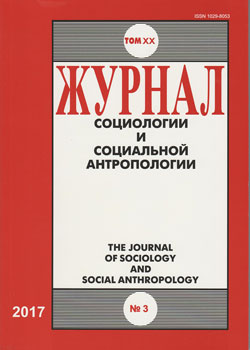Religious Tradition and Students’ Academic Success in Polish Catholic Schools: Developing a Private Education Sector
Abstract
The ways of post-socialist transformation in the Central and Eastern European countries have promoted diverse forms of the educational institutions. Paper presents the results of a qualitative sociological research that analyses the academic success of Catholic schools in Poland. The most part of private educational institutions in modern Poland are Catholic schools. When parents choose school for their children, they evaluate the quality of education. An increasing number of Catholic schools indicate importance of the Catholic values for middle class families. Sociological research was based on interviews with teachers and principals in Catholic schools in Warsaw and Gdansk (November 2015 — April 2016). Sociological analysis of school interactions with the family and the local community was focused on a broader consideration of education in terms of its openness and public accountability. Polish society, families and communities represents a complex configuration of heterogeneous values.References
Грыз Р. (2016) Римско-католическая церковь в Польской Народной Республике (1944/45-1989): формы сосуществования с режимом и роль идейной оппозиции. Государство. Религия. Церковь в России и за рубежом, 3(34): 11–43.
Митрега А. (2010) Современная польская семья: вызовы и риски постмодерна. Журналисследований социальной политики, 8(3): 373–392.
Bielska E., Radziewicz-Winnicki A., Roter A. (2005) Social and Educational Problems in Poland (Essays and Chosen Conceptions at the Background of the EU Accession). Katowice: Colonel.
Cichosz W. (2013) Mozliwosci dialogu wychowania chrzescijanskiego ze wspolczesna educacja Polska. Krakow: Pelplin.
Coleman J.S. (1988) Social Capital in the Creation of Human Capital. American Journal of Sociology, 94: 95–120.
Hallinan M., Kubitschek W.N. (2012) A Comparison of Academic Achievement and Adherence to the Common School Ideal in Public Schools. Sociology of Education, 85: 1–22.
Hobsbawm E. (1983) Introduction. Inventing Traditions. In E. Hobsbawm, T. Ranger (eds.) The Invention of Tradition. Cambridge: Cambridge University Press.
Maj A. (2002) Szkolnictwo katolickie w III RP (1989-2001). Wazszawa: Wydawnictwo Uniwersytetu Waszawskiego.
Mulvey J.D., Maloney A.T., Cooper B.S. (2014) Blurring the lines: Charter, Public, Private and religious Schools Coming together. Charlotte: Information Age Publishing.
Osewska E. (2012) The Current Situation of Education Profession Development of RE Teachers in Poland in the Context of the Social Challenges. The Person and the Challenges, 2: 123–131.
Smak M. (2014) Czynniki warunkujące zainteresowanie szkołami katolickimi. Opuscula sociologica, 4: 17–29.
Wronska K. (2014) The Polish Family in View of the Idea of a Civil Society, in Religion long forgotten. In D. Stepkowski, A. Murzyn (eds.), The importance of religion in education towards civil society. Cracow: Impuls: 207–223.
Bielska E., Radziewicz-Winnicki A., Roter A. (2005) Social and Educational Problems in Poland (Essays and Chosen Conceptions at the Background of the EU Accession). Katowice: Colonel.
Cichosz W. (2013) Mozliwosci dialogu wychowania chrzescijanskiego ze wspolczesna educacja Polska. Krakow: Pelplin.
Coleman J.S. (1988) Social Capital in the Creation of Human Capital. American Journal of Sociology, 94: 95-120.
Hallinan M., Kubitschek W.N. (2012) A Comparison of Academic Achievement and Adherence to the Common School Ideal in Public Schools. Sociology of Education, 85: 1-22.
Hobsbawm E. (1983) Introduction. Inventing Traditions. In: E. Hobsbawm, T. Ranger (eds.) The Invention of Tradition. Cambridge: Cambridge University Press.
Maj A. (2002) Szkolnictwo katolickie w III RP (1989-2001). Wazszawa: Wydawnictwo Uniwersytetu Waszawskiego.
Mulvey J.D., Maloney A.T., Cooper B.S. (2014) Blurring the lines: Charter, Public, Private and religious Schools Coming together. Charlotte: Information Age Publishing.
Osewska E. (2012) The Current Situation of Education Profession Development of RE Teachers in Poland in the Context of the Social Challenges. The Person and the Challenges, 2: 123-131.
Smak M. (2014) Czynniki warunkujące zainteresowanie szkołami katolickimi. Opuscula sociologica, 4: 17-29.
Wronska K. (2014) The Polish Family in View of the Idea of a Civil Society, in Religion long forgotten. In D. Stepkowski, A. Murzyn (eds.), The importance of religion in education towards civil society. Cracow: Impuls: 207-223.
Gryz R. (2016) Rimsko-katolicheskaja cerkov' v Pol'skoj Narodnoj Respublike (1944/45-1989): formy sosushhestvovanija s rezhimom i rol' idejnoj oppozicii. [Catholic Church in the People’s Republic of Poland (1944/45–1989): Forms of Co-Existence with the Regime and the Role of Ideological Opposition]. Gosudarstvo. Religiya. Tserkov v Rossii I za rubezhom [State. Religion. Church in Russia and abroad], 34(3): 11-43.
Mitrega A. (2010) Sovremennaya pol'skaya sem'ya: vyzovy i riski postmoderna [Modern polish family: challenges and threats of post-modernity]. Zhurnal issledovaniy sotsial'noy politiki [The Journal of Social Policy Studies], 8(3): 373-392.

